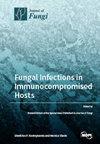Comparative Genomics of Fungi in Nectriaceae Reveals Their Environmental Adaptation and Conservation Strategies
IF 4.2
2区 生物学
Q2 MICROBIOLOGY
引用次数: 0
Abstract
This study presents the first genome assembly of the freshwater saprobe fungus Neonectria lugdunensis and a comprehensive phylogenomics analysis of the Nectriaceae family, examining genomic traits according to fungal lifestyles. The Nectriaceae family, one of the largest in Hypocreales, includes fungi with significant ecological roles and economic importance as plant pathogens, endophytes, and saprobes. The phylogenomics analysis identified 2684 single-copy orthologs, providing a robust evolutionary framework for the Nectriaceae family. We analyzed the genomic characteristics of 17 Nectriaceae genomes, focusing on their carbohydrate-active enzymes (CAZymes), biosynthetic gene clusters (BGCs), and adaptations to environmental temperatures. Our results highlight the adaptation mechanisms of N. lugdunensis, emphasizing its capabilities for plant litter degradation and enzyme activity in varying temperatures. The comparative genomics of different Nectriaceae lifestyles revealed significant differences in genome size, gene content, repetitive elements, and secondary metabolite production. Endophytes exhibited larger genomes, more effector proteins, and BGCs, while plant pathogens had higher thermo-adapted protein counts, suggesting greater resilience to global warming. In contrast, the freshwater saprobe shows less adaptation to warmer temperatures and is important for conservation goals. This study underscores the importance of understanding fungal genomic adaptations to predict ecosystem impacts and conservation targets in the face of climate change.花蜜科真菌的比较基因组学揭示其环境适应性和保护策略
本研究首次展示了淡水有袋真菌 Neonectria lugdunensis 的基因组组装,并对 Nectriaceae 家族进行了全面的系统发生组学分析,根据真菌的生活方式研究了其基因组特征。Nectriaceae 家族是下真菌门中最大的家族之一,其中的真菌作为植物病原体、内生菌和吸水菌具有重要的生态作用和经济意义。系统发生组学分析确定了 2684 个单拷贝直向同源物,为 Nectriaceae 家族提供了一个强大的进化框架。我们分析了 17 个油菜基因组的基因组特征,重点研究了它们的碳水化合物活性酶(CAZymes)、生物合成基因簇(BGCs)以及对环境温度的适应性。我们的研究结果突显了鲁格杜氏菌的适应机制,强调了其在不同温度下降解植物废弃物的能力和酶活性。不同内生菌生活方式的比较基因组学发现,它们在基因组大小、基因含量、重复元件和次生代谢物产量方面存在显著差异。内生菌表现出更大的基因组、更多的效应蛋白和BGCs,而植物病原体则具有更高的热适应蛋白数量,这表明它们对全球变暖具有更强的适应能力。相比之下,淡水根瘤菌对气温变暖的适应能力较弱,对保护目标非常重要。这项研究强调了了解真菌基因组适应性对于预测气候变化对生态系统的影响和保护目标的重要性。
本文章由计算机程序翻译,如有差异,请以英文原文为准。
求助全文
约1分钟内获得全文
求助全文
来源期刊

Journal of Fungi
Medicine-Microbiology (medical)
CiteScore
6.70
自引率
14.90%
发文量
1151
审稿时长
11 weeks
期刊介绍:
Journal of Fungi (ISSN 2309-608X) is an international, peer-reviewed scientific open access journal that provides an advanced forum for studies related to pathogenic fungi, fungal biology, and all other aspects of fungal research. The journal publishes reviews, regular research papers, and communications in quarterly issues. Our aim is to encourage scientists to publish their experimental and theoretical results in as much detail as possible. Therefore, there is no restriction on paper length. Full experimental details must be provided so that the results can be reproduced.
 求助内容:
求助内容: 应助结果提醒方式:
应助结果提醒方式:


